

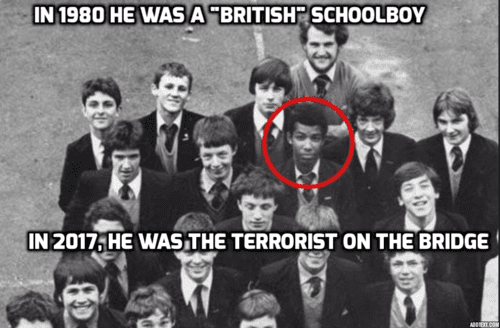
03/24/2017
[Adapted from the latest Radio Derb, now available exclusively on VDARE.com.]This week our subject is "Life in Derbistan" or London as it used to be. I’m going to indulge myself in some nostalgia. It’s geezerish, I know. But reading about the terrorist attack on London’s Westminster Bridge this Wednesday got me thinking about London, and I began to nostalge.
(Is that a verb, "nostalge"? "I nostalge; you nostalge; he, she, or it nostalges?" If it isn’t, it ought to be.)
So here goes with a trip down Memory Lane.
I was raised in a sleepy small provincial town whose natives referred to London, seventy miles southeast of us, as "the Smoke." I only really got acquainted with London when I went to college there, from 1963 to 1966.
The colleges of London University didn’t have much residential accommodation. I lived for those three years in rented rooms, in private houses owned by Londoners. My very first semester’s landlord was an employee of Pentonville Prison in north-central London. He had fun stories about executions, capital punishment being then still on the books in England.
Not wanting to pay rent while back in my home town for vacations, I changed lodgings every semester, and sometimes mid-semester. So I got a good random selection of Londoners as landlords, or more often landladies.
A single rented room in a private house was called a "bedsitter," and that’s what I lived in those three years. There was a whole bedsitter culture back then. Spike Milligan wrote a play titled The Bedsitting Room. Quentin Crisp described the bedsitter environment in his memoir The Naked Civil Servant.
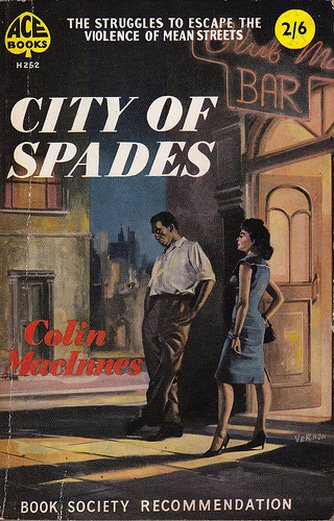
London in the early 1960s wasn’t very diverse by current standards. My landlords and landladies were mostly English, or in one case Welsh. I did have a West Indian landlady for half a semester: a plump Trinidadian mulatto, pleasant enough when not in a mood, but a terrible housekeeper, with a host of men friends who shared her intimate favors serially on some schedule I never figured out.
The only other non-British foreigner was a Greek Cypriot, who threw me out summarily because he thought, mistakenly, I'd made a pass at his wife. People who knew Greek-Cypriot culture told me I was lucky to get away with all my parts still attached.
The modern immigration boom was well under way, but in London there were only a few small concentrations of blacks, and light scatterings of others like the Cypriots and Chinese.
The city had had its first black race riot in 1958. A poll taken five years later would I am sure have shown that most English people would have preferred the blacks to leave. But it wasn’t something people thought about much, so nothing was done. There was even some plantation-style paternalist affection towards blacks — on TV, The Black and White Minstrel Show was very popular.
Islam was even less of an issue. Muslim countries themselves were either keen to modernize or sunk in medieval apathy. For those trying to modernize, Islam was a dusty relic of the past that was only holding them back. That’s why you had these secular dictatorships like Nasser’s Egypt or Ba'ath Syria.
Nobody in London spoke or thought about Islam.
Notwithstanding which, Pakistani immigrants were deeply unpopular. Blacks, with all their faults, were at least cheerful, colorful, and musical. Pakis were none of those things, and were widely disliked. There was a genre of Paki jokes going round, some of them quite nasty. Here’s one of the milder ones:
A Pakistani is at London airport for a trip home. He’s sixpence short of the air fare, though. He approaches an English traveler. "Excuse me, Sir," he says the Paki, "Could I ask you for sixpence, please? I’m trying to get home to Pakistan."The Englishman reaches into his pocket and brings out a half crown [equivalent to five sixpences]. "Here," he says, "take four of your pals with you."
There was some diversity in the student body of course. My math class contained a Chinese lad from Hong Kong, an early instance of the Asian math nerd. He introduced us to ngau-yuk-gon, the Cantonese version of beef jerky, which I still have a taste for.
In the Muswell Hill district, where I lodged for a year, there was also a clique of West African students, twenty-something guys from well-off families in Ghana, at that time under the dictatorship of the buffoonish Kwame Nkrumah, whom they all despised.
I hung out with them for a while, and learned some scattered things about West African culture. Tribalism, for example: One of them would say of another, "Oh, Kofi’s all right, but it was his people that put my father out of business …" Naming customs, too: If I were Ghanaian, my name would be Kwasi, because I was born on a Sunday — it goes by day of the week.
And drugs, of course. The Ghanaians all smoked hash in their leisure hours. I tried to join in for the sake of companionship, but it made me throw up.
I've never since bothered much with recreational pharmaceuticals. I didn’t cut much of a figure as a bohemian.
The Britain of fifty-odd years ago was a high-trust society. I had a girlfriend in my home town, and weekends I'd go home to see her. My normal mode of travel for those seventy miles was to hitch-hike. I'd take the subway out to Hendon Central, walk a half-mile to the on-ramp for the M1 (Britain’s first expressway, then new), and stand there with my thumb out, trying to look pleasant. Some truck driver or traveling salesman would pull over seeking some conversation on his drive, and an hour and a half later I'd be home.
It was the standard way of getting around if you had no money: not just in Britain, either, but all over Europe. In my 1964 summer vacation I hitch-hiked clear across the continent, to the Black Sea and back.
That was the London I knew, in the England I knew, in my salad days. It had plenty of blemishes, of course. There was terrific class snobbery and a smug, stuffy Establishment, not many of whom practiced noblesse oblige. A few years later, Irish terrorism came up, and made a nuisance of itself — sometimes a lethal one — to Londoners.
Still it was a country, whose various classes and subgroups knew each other — and close neighbors like the Irish — from long acquaintance, even if they didn’t necessarily like each other. Occasionally lunatics did crazy horrible things. But they were our lunatics and we dealt with them our way.
I’m aware that I approach National Question issues with that lost England in mind. I want to live in a country with a big solid majority of one race, one culture. I don’t mind there being others around, and in fact think it’s a healthy thing — salt in the stew. Foreigners can be interesting and amusing.
It’s all a matter of numbers, numbers and concentrations. Don’t take in too many, and discourage clustering — especially in this age of modern communications, when immigrants can bring their native country with them.
Is such an arrangement actually possible in this world today, though, with cheap air travel and low trade barriers?
It surely is: Japan, for example, is a pure Derbistan, as I just described the ideal.
That brings Japan in for a lot of scolding from the Open-Borders mob. Mass-immigration fanatic Bret Stephens was lecturing them in The Wall Street Journal the other day:
On current trend the population will fall to 97 million by the middle of the century. Barely 10 per cent of Japanese will be children. The rest of the population will divide almost evenly between working-age adults and the elderly.[Other People’s Babies, Wall Street Journal, March 20, 2017 ]
That doesn’t sound so bad. Late 20th-century Japan was very overcrowded. A population drop to 97 million would be good; 50 million would probably be better. The age distribution doesn’t much matter, with modern healthcare and productivity. Once the baby-boomers have died off and it’s these smaller age cohorts that are aging, it will matter even less.
Or if the Japanese want to get their population back in nine digits via mass immigration, it’s a democratic country and they can elect politicians who'll take care of that.
But the Japanese show no inclination to do so, for all Bret Stephens' hectoring.
Is it too late to get Britain back to the Derbistan ideal? My guess would be that it probably is. The place — that’s what it is now: a place, not a country — the place is irrevocably wrecked.
Still, something is owed to honesty. The Brits should at least admit — some national figure, a member of the Royal Family, for example, should publicly admit — that in the matter of mass immigration, the Brits long ago made a horribly wrong decision, while the Japanese made the right one.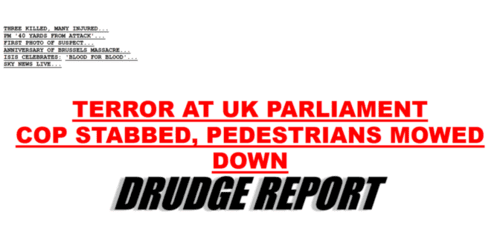
The Brits destroyed their country. The Japanese preserved theirs.
All that was brought to mind by the incident in London on Wednesday.
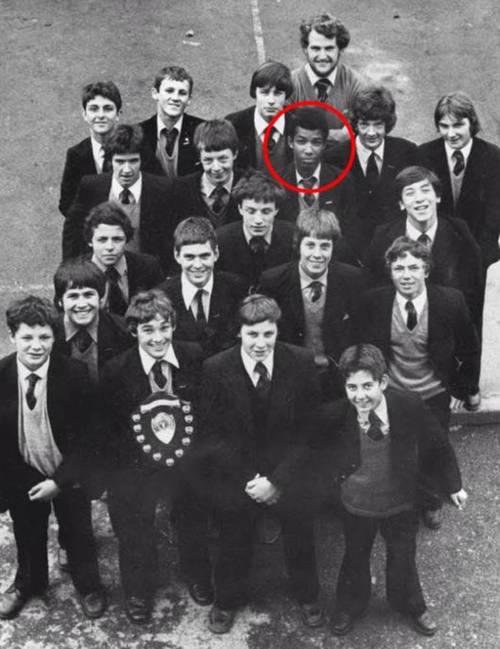
A Muslim terrorist, of the "lone wolf" variety so far as we know, drove his car into pedestrians strolling on Westminster Bridge, killing three and wounding forty. When he arrived at the north end of the bridge, he jumped out and ran into the Houses of Parliament yard, brandishing a knife. He stabbed a policeman to death before being shot dead himself. The killer was identified as Khalid Masood. [From smiling Kent schoolboy to murdering jihadi: Police release mugshot of Westminster terrorist as schoolfriend reveals popular footballer suffered 'mild racism' for being the only black student, By Martin Robinson, UK Chief Reporter and Alex Matthews and Gareth Davies and Thomas Burrows for MailOnline, March 24, 2017]
The Main Stream Media, terrified that anyone might make an immigration connection, went to much trouble to emphasize that he was “British-born.”

He was indeed, but there is more to be said. In fact Masood was black, or at any rate mulatto, born to a 17-year-old English mother and an unknown but presumably black father 52 years ago — just when I was sampling hashish and hiding from enraged Cypriots in North London bedsitters. [ Khalid Masood: Everything we know about the London attacker, By Robert Mendick, Telegraph, March 24, 2017]When he was two years old his mother married a Nigerian gent, surname Ajao, who may or may not have been his biological father — nobody seems to know. He was thereafter raised as Adrian Russell Ajao. A career petty criminal, the future Khalid Masood was apparently converted to Islam in jail.
That seems to happen a lot, especially to blacks. Being in jail sure happens to British blacks a lot: Ten percent of inmates in British jails are black, though they are less than three percent of the general population.[UK Prison Reform Trust — Race And Prisons]

For all the MSM’s glee about him being British-born, Masood actually illustrates a thesis I've been arguing for years: that it’s not the first generation of immigrants you need to worry about so much as the second and subsequent generations.
As I have argued, some assimilate, some ab-similate. Some immigrant lines become more like us while some go the opposite way, becoming more alienated — they ab-similate. Ab-similation is especially probable when there is a deep difference in race or religion, with blacks and Muslims being the most likely to ab-similate.
The human tragedies of Masood’s victims make sad reading. One of those killed on the bridge was an American tourist, on a European vacation with his wife to mark their 25th wedding anniversary. The wife was badly injured. Another fatality on the bridge: a woman on her way to pick up her kids from school. She was thrown in the path of a double-decker bus and crushed to death. The third bridge fatality was a 75-year-old working-class Londoner, native English. [Killed on his way a hospital appointment, By Mark Duell for MailOnline, March 24 2017]
Many of those not actually killed will have had their lives destroyed. A 29-year-old Romanian tourist, celebrating her birthday in London with her fiancé, was thrown off the bridge into the river, suffering serious head injuries and damaged lungs.
Aside from the personal human dimension, the attack was a strike at English culture, at Englishness itself. Westminster Bridge stands at the heart of Englishness. On the north bank is the Palace of Westminster, where England’s laws have been made for 750 years. Next door is Westminster Abbey, built almost a thousand years ago, for centuries the last resting place of England’s kings, queens, heroes and poets.
On the south side of the bridge is St. Thomas' Hospital, whose origins go far back into the unknown past, and Lambeth Palace, London residence of the Archbishop of Canterbury, who leads the Church of England.
If you hate England and the English and want to hit them where it hurts most, this is the place to strike.
It’s hard to believe Khalid Masood didn’t have that in mind.
Britain’s elites responded to the attack in General Casey style — “As horrific as this tragedy was, if our diversity becomes a casualty, that would be worse.”
The worthless, dithering Prime Minister, Theresa May, who was in charge of U.K. immigration policy for six years without making any perceptible dent in the numbers flooding in, summoned up the spirit of the Blitz, assuring her countrymen that “values of freedom of speech, liberty and democracy” would prevail.
I wouldn’t bet on it. Freedom of speech already effectively abolished in Britain by the Racial and Religious Hatred Act of 2006. Diversity is not strength. You can’t have deep differences of race and religion while maintaining the kind of liberties Englishmen traditionally enjoyed.
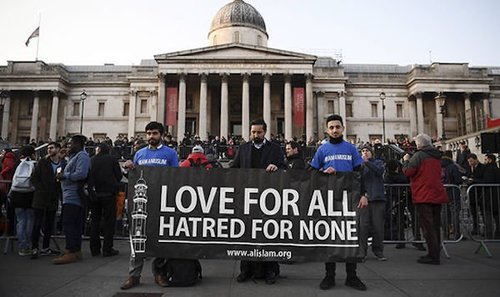
And while it’s certainly stirring for a British politician to summon the spirit of the Blitz, that leads to the awkward reflection that the Blitz was an attempt by foreign would-be conquerors to bend the British to their will.
The Brits of nowadays bend way more easily than their grandfathers did. They have reacted in good General Casey fashion, with floral tributes to the dead, moments of silence, and, yes, candlelight vigils all decorated with assurances of national unity and respect for Islam.
London’s Mayor Sadiq Khan, an Islamic supremacist of the stealth variety, presenting a calm, reasonable manner for the TV cameras while his people quietly infiltrate and take over, told viewers that "We won’t be cowed by terrorists."[Donald Trump Jr criticises London mayor after terror attack, BBC, March 23, 2017
Who do you mean by "we," Kemosabe?
The Mayor’s comments have an American dimension. Last September, after a bombing by an Afghan immigrant in New York City, Mayor Khan told a British newspaper that the threat of terror attacks is "part and parcel of living in a big city." [Sadiq Khan: London mayor says terror attacks 'part and parcel' of living in a major city, By Gabriel Samuels, Independent, September 22 2016].
Well, Donald Trump Junior, our President’s son, tweeted that quote following last Wednesday’s Westminster attack, garnished with the comment, "You have to be kidding me."
That raised gasps of horrified outrage from Goodthinking Americans. Several of them noticed a previous connection between the Trumps and London’s Mayor [London mayor couldn’t care less about Donald Trump Jr.’s tweets,By Yaron Steinbuch, NY Post, March 23, 2017]. The Goodthinkers have quoted with approval the Mayor’s comment last May that Donald’s father, now President Trump, was "ignorant" about Islam. [Sadiq Khan: Donald Trump’s views on Muslims are ignorant — video, May 16, 2015]
The definitive response to that is the one tweeted by the blogger Iowahawk a few months ago when TV talking head Piers Morgan opined that jihadi terrorists were not practicing true Islam.
.@piersmorgan ISIS leader Abu Bakr al-Baghdadi has a PhD in Islamic theology from Islamic U of Baghdad. What are your credentials?
— David Burge (@iowahawkblog) November 14, 2015
I'll adapt Iowahawk’s remark to the current situation, thus: Sadiq Khan has a law degree from a British university, ISIS leader Abu Bakr al-Baghdadi has a Ph.D. in Islamic theology from the Islamic University of Baghdad. In the matter of what is true Islam, which one should we believe?
All the soothing words and earnest declarations of national unity have worked their magic, though. Everyone’s feelings have been soothed — everyone’s feelings except, of course, the feelings of those bereaved or crippled by Mr. Masood’s actions.
Now the Brits can relax, sink back into their lotus dreams of prosperity and racial harmony — — until the next Islamic — immigration — atrocity.
John Derbyshire writes an incredible amount on all sorts of subjects for all kinds of outlets. (This no longer includes National Review, whose editors had some kind of tantrum and fired him. ) He is the author of We Are Doomed: Reclaiming Conservative Pessimism and several other books. He’s had two books published by VDARE.com: FROM THE DISSIDENT RIGHT (also available in Kindle) and From the Dissident Right II: Essays 2013. His writings are archived at JohnDerbyshire.com.